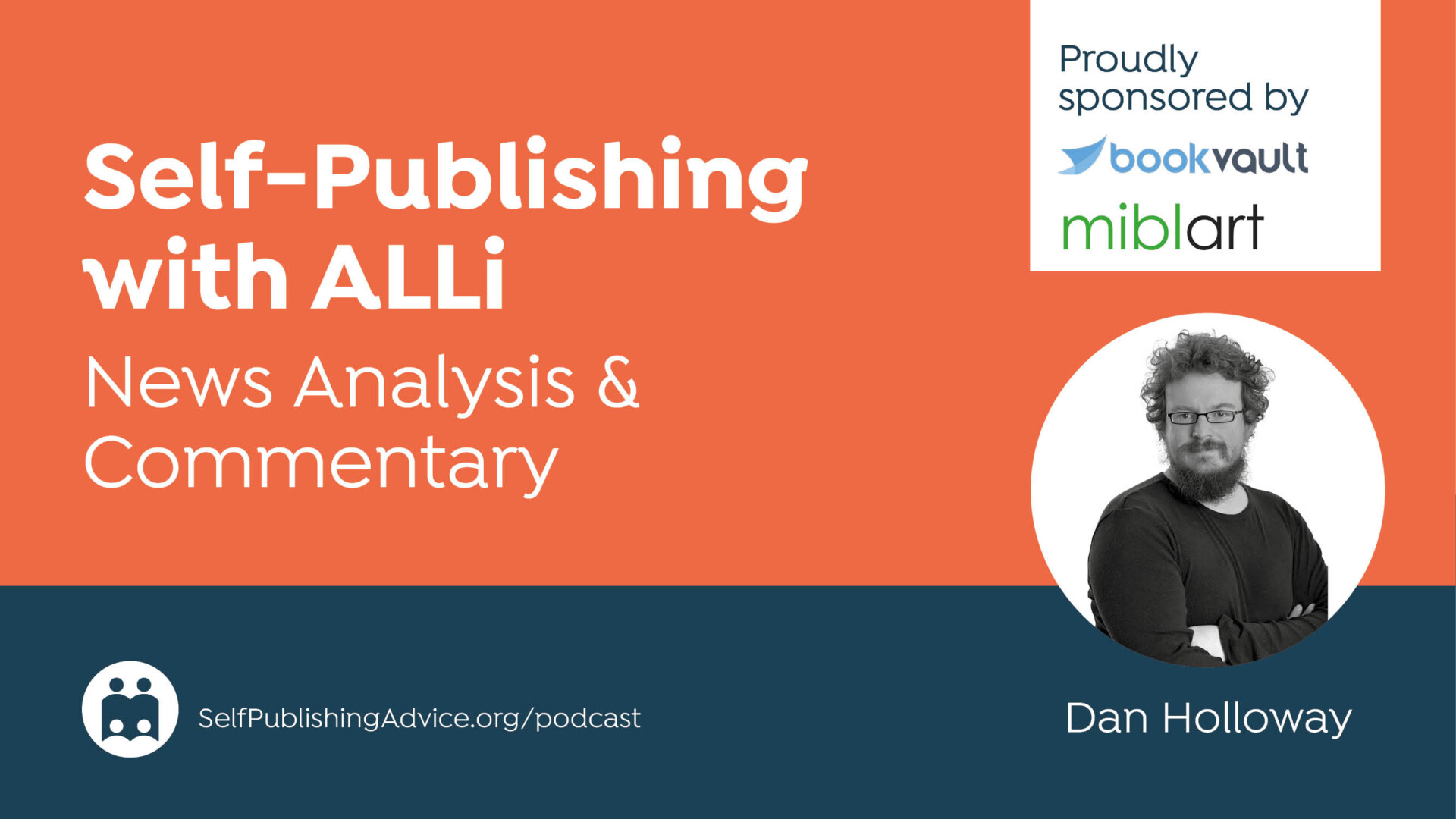On this episode of the Self-Publishing News Podcast, Dan Holloway reports on academic publisher Taylor & Francis using AI to translate books into English, sparking backlash from translators. He also covers OpenAI’s controversial Studio Ghibli–style image filter and its copyright implications and notes the end of WH Smith’s presence on the UK high street as the retailer shifts focus to airport book sales.
Listen to the Podcast: Former Book Retailer of the Year Disappears from High Street
Sponsors
 All our ALLi podcasts are proudly sponsored by Bookvault. Sell high-quality, print-on-demand books directly to readers worldwide and earn maximum royalties selling directly. Automate fulfillment and create stunning special editions with BookvaultBespoke. Visit Bookvault.app today for an instant quote.
All our ALLi podcasts are proudly sponsored by Bookvault. Sell high-quality, print-on-demand books directly to readers worldwide and earn maximum royalties selling directly. Automate fulfillment and create stunning special editions with BookvaultBespoke. Visit Bookvault.app today for an instant quote.
Self-Publishing News is also sponsored by book cover design company Miblart. They offer unlimited revisions, take no deposit to start work and you pay only when you love the final result. Get a book cover that will become your number-one marketing tool.
Thoughts or further questions on this post or any self-publishing issue?
 If you’re an ALLi member, head over to the SelfPubConnect forum for support from our experienced community of indie authors, advisors, and our own ALLi team. Simply create an account (if you haven’t already) to request to join the forum and get going.
If you’re an ALLi member, head over to the SelfPubConnect forum for support from our experienced community of indie authors, advisors, and our own ALLi team. Simply create an account (if you haven’t already) to request to join the forum and get going.
Non-members looking for more information can search our extensive archive of blog posts and podcast episodes packed with tips and advice at ALLi's Self-Publishing Advice Center.
About the Host
Dan Holloway is a novelist, poet, and spoken word artist. He is the MC of the performance arts show The New Libertines, He competed at the National Poetry Slam final at the Royal Albert Hall. His latest collection, The Transparency of Sutures, is available on Kindle.
Read the Transcripts
Dan Holloway: Hello, welcome to another Self-Publishing News podcast from Oxford, where it is Oxford Literary Festival, which is always a nostalgic time of year for me, because it was at the, not the Oxford Literary Festival, the alternative festival that I ran for a few years here, that I first met Orna back in the very, very earliest days of ALLi, in the very early 2010s.
Taylor and Francis Announce use of AI to Translate Works into English
Obviously, a lot has changed since then. One of the things that has changed most since then is the emergence, obviously, of AI in the literary world, and that has been dominating the news in a big way.
Obviously, with the Meta and LibGen/Library Genesis, revelations, and all the various responses to that which continue to rattle on. I won't go on too much about that because that's last week's news, although it's still obviously carrying on this week, but AI is still in the news this week in other news.
Primary amongst that is the announcement by Taylor and Francis, which is one of the world's largest academic publishers, that they are going to be using AI translation to bring a large number of works that are not currently available in English to a larger audience, they say by translating them into English using AI.
This has caused some upset, obviously, amongst writers and translators. So, translators you will remember from last year, RA Group who are feeling the pinch, particularly from AI at the moment.
So, a Society of Authors survey last year found that 4 out of 10 translators felt that they had already had a reduced income as a result of AI.
Obviously, my day job is here at the University of Oxford. I head up the administration team in the faculty of Linguistics, we are very closely associated with the faculty of modern languages. I can, whilst maintaining professional confidentiality, secrecy, and all such things, I can safely say that the impact of AI on translation and the future of jobs in translation is, let's just put it, definitely a discussion that people are having within the wider translating world.
So yes, I think I absolutely understand the Society of Authors or the position of writers on this and translators that they are upset that Taylor and Francis have joined this, but it does feel that in a lot of this world, there is an acceptance that there is a certain amount of bolting horses and stable door shutting going on, and that we cannot hold back the inevitable.
Instead, we need to find other ways to ensure that the value of human translation is adequately recompensed.
Fury Surrounding OpenAI’s Studio Ghibli Filter
Talking of upset with AI, the big news this week has been the fury around OpenAI's Studio Ghibli filter that OpenAI have developed that will enable you to take a picture and develop a Studio Ghibli-esque image from it, complete with beautiful washy backgrounds and cute characterization.
Of course, the question has arisen, how were they able to do this?
Presumably, in order to produce this, they must have trained things on Studio Ghibli, the images that they almost certainly didn't have the copyright to. Interestingly, reading the TechCrunch report on this, it is clear that the legal position is that “in the style of” functions are not in themselves breaches of copyright.
That doesn't of course mean to say that how firms came to be able to produce “in the style of” things is entirely within the bounds of existing copyright law.
But it is something that has caused a lot of controversy amongst artists and writers.
I've seen people saying, why bother producing anything original anymore when it's just going to be snapped and used to produce slop, I believe is the technical term, that replicates it using AI?
So, this is almost proving one of the existential moments for the creative community around AI, with lots of people seeming to question their purpose as artists and writers.
I'm an optimist. I'm neither a technophobe. I'm not what one of what Mark Williams delightfully calls the Luddite Fringe. I love Mark dearly and I love his turn of phrase. I'm not sure I think of them as Luddite Fringe myself, but I am not one of that group who is who vehemently anti-AI. I can see some things it does very well, but I also think as an artist it feels as though there are opportunities for us to work out how to create things within this new landscape and to assert our value as human creators.
So, I think that just as always happened, we will find ways, even if we don't work with new technology, to work around it and assert our human value.
That's my contribution to the existential debate.
WHSmith Closes High Street Stores
I will sign off the AI for now and move on to a decidedly sad story for anyone who grew up in an era when I did, and that is the disappearance from the high street of the WHSmith brand.
So, this is one of the large UK retailers. It has sold its 480 high street stores, and this matters because in 2016, WHSmith was Book Retailer of the Year. That caused a lot of raised eyebrows at the time. I think I reported on it back then.
People were unhappy because, what's a big box retailer doing getting into books? They know nothing about books. But actually, Smiths brought millions of people into contact with books, specifically through the Richard and Judy book club, which was basically responsible for getting a whole generation and more of people reading, and reading together, and seeing the value of books in people's lives, and the social value of books and book clubs.
Anyway, they have decided they're focusing on their global airport brand. They've almost single-handedly coined the term airport novel because of all those WHSmith outlets at airports where they sell the airport novel. That's a very profitable line of business. They are sticking with that, giving up essentially on the high street.
It has been taken over by a firm. We seem to be getting a lot of very unoriginal renaming at the moment. We had Boundless last week taking over from Unbound. This week we have TG Jones taking over from WHSmith.
I comment on that in my column. I'm sure those of you with an alphabet and basic knowledge of English surnames will be able to realize just how unoriginal that is.
With that note of unoriginality, I will leave you for the week. I'm about to head down to the Bodleian Library and have a look to see what's going on at Oxford Literary Festival this year. Maybe I'll have some snippets for you for next week. I look forward to speaking to you then. Thank you.




